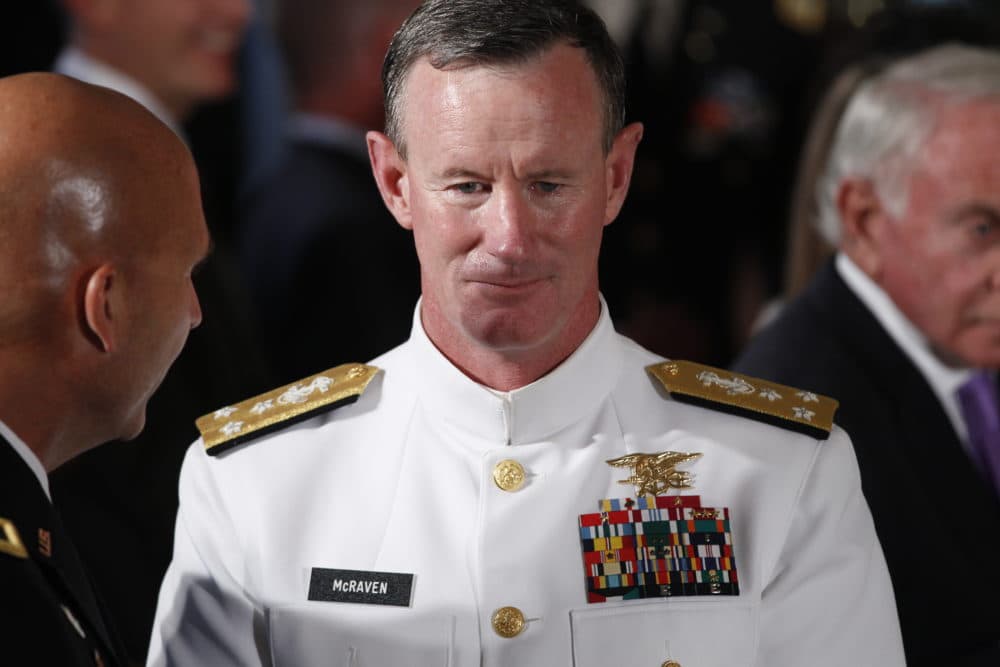Advertisement
'Really An Amazing Moment': Former Army Officer On Trump And Security Clearances
Resume
Retired Navy Adm. William McRaven, who oversaw the raid that resulted in the death of Osama bin Laden, is asking President Trump to revoke his security clearance. In an opinion piece for The Washington Post, he expressed solidarity with former CIA Director John Brennan after Trump revoked Brennan's security clearance earlier this week.
"If you think for a moment that your McCarthy-era tactics will suppress the voices of criticism, you are sadly mistaken," McRaven writes. "The criticism will continue until you become the leader we prayed you would be."
Here & Now's Lisa Mullins speaks with Jason Dempsey (@Jason_K_Dempsey), senior fellow at the Center for a New American Security. He's also a retired Army infantry officer who served two tours in Afghanistan and one in Iraq.
What makes McRaven's letter unique is that he previously had no partisan identity other than as a highly respected Navy admiral, Dempsey says.
"We're in a position in America where there's really only one national institution standing that has the trust and confidence of the American people, and that's the American military," he says. "Now, a lot of folks who have criticized [the government] before with military experience, they've come out and criticized Trump maybe after they've made political views known or after they've kind of entered the arena for a while."
Interview Highlights
On what makes McRaven's strong criticism of Trump so unique
"What's unique about McCraven is he's kept his powder dry and his cards kind of close to his chest. And again, most people don't see him as anything other than a highly respected Navy admiral. So for him to come out and to come out so strongly, the question is: Is this a McCarthy-Welch moment when the senior counsel to the U.S. Army in the midst the McCarthy hearings said, 'Finally sir, do you have no sense of decency?' Of course that episode seems wildly quaint when you compare it to the invective and political discourse today, but that was the beginning of the downfall of McCarthy. And it's interesting that McRaven mentioned McCarthy in his letter because there might be some parallels here where this finally breaks the dam whereas other criticisms haven't."
On how this could impact the bigger picture of civilian-military relations
"It used to be that politics stops at the water's edge. That was kind of the Cold War consensus between the two parties. There was a recognition and an agreement that the Soviet Union back then was the enemy. Everybody was on board, and people wouldn't snipe at each other politically when it came to issues of national security. That concept was buried long ago, and this is certainly one of, if not among the last, nails in that coffin. Right now, everything is partisan. Everything is political. ... We're entering a period of vast disagreement of even about how to approach our friends and enemies, and it's going to take a little while for that to shake out."
"It used to be that politics stops at the water's edge. ... People wouldn't snipe at each other politically when it came to issues of national security. That concept was buried long ago."
Jason Dempsey
On how senior leaders' criticism impacts the military hierarchy
"That's what we've always been afraid of, you know, those of us in the military and those of us who study civil military relations, is this idea that once senior leaders, even if they're retired, jumped directly into the partisan fray, that cascades down into the force. And what we don't want to see or what most of us fear, is this idea that you would start having a partisan military, or where a partisan identification would become something that politicians take into account at lower and lower levels of promotion. If one side is saying that this president is absolutely incapable of leading the force, then you're going to have further self-selection of people who want to enter into the military. It has a whole host of cascading issues, including what's legal, what orders do you follow and what's in the best interest of America."
On how partisanship could impact military recruitment and promotions
"So if the military becomes seen as an increasingly partisan institution, and there's some evidence out there and the scholarship that it is seen a little bit that way. ... My research and evidence shows the military largely reflects the American population in terms of political ideology, but because of the actions of a lot of senior officers of the '90s and 2000s, there is a perception that the entire force kind of leans Republican. And so what you do is you get a feedback effect where somebody thinks, 'Hey, maybe I want to join, but maybe I'm not all in on one specific ideology. Maybe I don't want to go hang out with folks like that.' It's easy to see how military officers getting involved — recently, retired military officers getting involved — in debates like this can influence how senior political leaders interact say with the chairman of the Joint Chiefs or the Service Chiefs. They're constantly thinking, 'OK what's this guy going to say when I relieve him? Or how do I pick a replacement that won't turn into an enemy?' "
This segment aired on August 17, 2018.